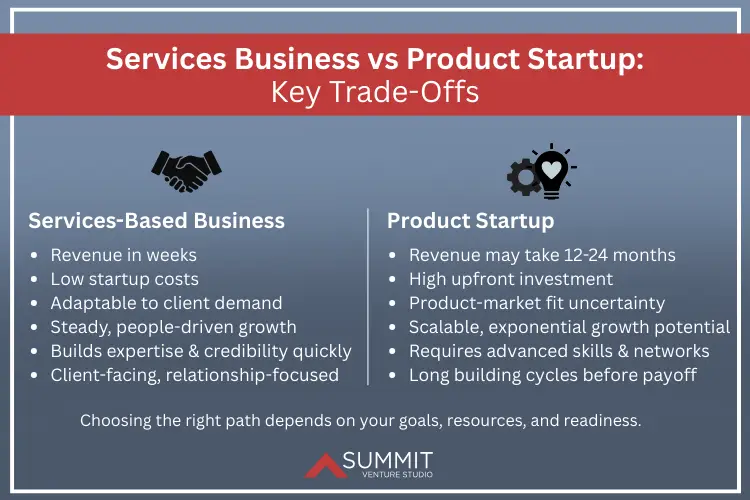Part 6 of 6 · The Entrepreneur’s Guide to University Tech Transfer
Starting a company means making tough choices right away. One of the biggest? Deciding whether to launch a services business or a product startup.
At first glance, the choice might seem obvious. Products scale, while services may not. But the reality is more nuanced. Each path comes with its own set of trade-offs in risk, funding, customer acquisition, and founder workload.
This post lays out those trade-offs clearly and provides a practical framework to help entrepreneurs evaluate which path aligns with their skills, goals, and resources.
(If you’re exploring how to connect with universities to review their technology portfolios for a roll-out, start with our guide on how to find and approach a tech transfer office.)
Two Very Different Paths for Founders
Every entrepreneur faces the same fork in the road:
- Services business (consulting, agencies, training, implementation)
- Product startup (software, hardware, platforms, apps)
Both can succeed. But they demand very different time horizons, capital, and expertise. The cost of choosing without clarity can be high, leaving founders stuck in the wrong model or forced to pivot too late.
Why Choosing Blindly Is Risky
When founders choose a model without thinking through the trade-offs, problems often follow:
- Jumping into products too early can mean long development cycles, investor pressure, and high risk of failure before reaching paying customers.
- Leaning only on services can limit scalability and trap you in client-by-client growth unless you intentionally build systems or intellectual property.
And the stakes are significant:
- Services offer faster cash flow but require ongoing human effort.
- Products offer scalability but demand upfront investment, a longer path to revenue, and a higher risk that the market may not be adequate.
Tip: When you’re evaluating whether a product idea is worth the longer runway, you’ll want to look closely at market size and demand. A structured starting point is the U.S. Small Business Administration’s guide to market research.
A Framework for Making the Choice
Here are six areas to consider as you weigh service- versus product-based businesses:
1. Cash Flow Timeline
Services: Revenue can start in weeks.
Product: May take 12-24 months to reach meaningful revenue.
Ask yourself: Do I need income now, or can I sustain a longer runway?
2. Upfront Investment
Services: Lower-cost to start, but require time, skill, and effort to acquire clients.
Product: Requires capital for design, development, and testing before launch.
Ask yourself: Do I have the resources (or backers) to fund product development?
3. Market Risk
Services: Lower risk, since offerings can be adapted to demand.
Product: Higher risk, since achieving product-market fit is costly and uncertain.
Ask yourself: How much uncertainty am I prepared to manage?
4. Scalability & Growth
Services: Growth is tied to people and processes; scaling is gradual.
Product: True scalability – growth can multiply without linear cost increases.
Ask yourself: Do I want steady, service-driven growth, or am I aiming for exponential scale?
5. Learning & Credibility
Services: Build expertise, relationships, and a professional track record more quickly.
Product: Requires advanced skills, networks, and persistence to succeed. The learning curve is steep, especially for first-time founders tackling funding, technical execution, sales, marketing, and product-market fit simultaneously.
Ask yourself: Do I already have the depth of skills and connections needed for a product startup, or do I need a different entry point?
6. Lifestyle Fit
Services: Demand ongoing client interaction and adaptability.
Product: Demands long building phases before results are visible.
Ask yourself: Do I enjoy client-facing work, or do I want to focus on building systems and IP?

A Practical Checklist for Founders
Use this checklist to begin weighing your options. Mark the points that resonate most with your current situation:
- I need revenue in the next 3-6 months.
- I have limited capital to invest.
- I want to build flexibility into my early offerings.
- I thrive in client-facing work.
- I’m comfortable with slower, steady growth
-OR-
- I can sustain myself financially for 1-2 years.
- I want to build defensible IP and brand equity.
- I’m ready to manage higher risk in pursuit of scalability.
- I have access to networks, mentors, and resources to support product development.
- I prefer long-term building over short-term client work.
The decision between a services business vs product startup comes down to cash flow, scalability, risk tolerance, and founder readiness. Services likely deliver revenue quickly, while products demand patience and investment but unlock scalability.
Recap
The decision between building a services business and a product startup is less about right versus wrong, and more about fit.
At Summit Venture Studio, we specialize in product-based startups built on university technologies. That journey is demanding, requiring capital, expertise, and persistence. But it can lead to transformative growth. For founders just beginning their entrepreneurial path, services may provide valuable experience before tackling the unique challenges of a product-based venture.
FAQ
A services-based business provides expertise or labor directly to clients. A product-based startup creates scalable products (like software or hardware) that can be sold repeatedly without direct labor.
Services are easier and cheaper to launch, generate revenue quickly, and help build expertise. They’re often seen as a practical training ground before tackling product-based ventures.
Yes. Many founders develop products based on insights from client work, using services as a springboard for product ideas and early market validation.
Products require capital and long development cycles. The biggest risk is failing to achieve product-market fit before resources run out.
Evaluate your cash flow needs, tolerance for risk, access to networks, and long-term goals. Services often fit founders who need income quickly, while products are suited for those prepared to take on higher risk for scalability.
Want to explore the opportunities Summit Venture Studio is building from university innovations?


